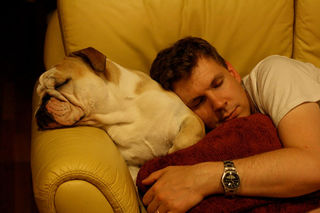Sleep
5 Myths About Insomnia to Help You Sleep Tonight
A good night's sleep is only a read away.
Posted January 20, 2017

There’s no doubt that we place higher value on whatever is scarce or hard to achieve. For example, thinness in a land of plenty, girth in a time of deprivation. But this year’s big rarity? Forget the holy grail of finding Dratini in Pokemon Go: Instead, the most prized accomplishment of 2017 may be getting enough sleep.
After all, in a world where work-life balance is quickly becoming an urban myth, it’s no wonder that a night of healthy sleep has become something of a status symbol.
See also: How Sleep Makes You Fit
But what does “healthy sleep” even mean? And more importantly—is it possible? Misinformation abounds, so let’s fact-check five myths to help you make the most of your nightly shuteye.
Myth #1: Adults Need 8 Hours of Sleep
Not true! Surprised? Turns out sleep shouldn’t be a one-size-fits all approach. Instead, the amount of sleep an individual needs falls within a range; for you and your life, it may be anywhere between 5 and 10 hours.
To help you determine your magic number, look for some clues. If you find yourself falling asleep in front of Netflix each evening or need a constant stream of caffeine to keep your mind on track, your ideal number of sleep hours is probably higher than what you’ve been getting. Try heading to bed a bit earlier until you can get through your day without propping your eyelids open with toothpicks.
Myth #2: Getting Woken Up At Night Costs Me Only Those Minutes
Not so! Unfortunately, changing your pajamas after a hot flash, answering the phone if you’re on call, or of course, comforting a crying baby costs you much more than those minutes of sleep. A 2014 study in the journal Sleep Medicine looked at the effects of sleep interruption over two nights and confirmed what every new parent already knew.
In the study, the first night, all the study participants slept for 8 hours. Researchers then measured their mood and ability to pay attention. Good so far.
The next night, the participants were split into two groups. Half slept for only 4 hours, while the other half slept for 8 hours but got woken up 4 times for 10-15 minutes at a stretch. So technically, they spent at least 7 hours asleep—3 hours longer than the 4-hour group—just interspersed with awakenings. The next day, everyone’s mood and attention was measured again.
Anyone who’s ever had a newborn or been on call for work can predict what happened next: the mood and attention of folks with interrupted sleep were just as bad as those who slept for only 4 hours. Both groups felt depressed, irritable, and had a hard time getting going. Plus, performance on the attention task got worse the longer they kept at it. Indeed, whoever coined the term “sleep like a baby” clearly never had one.
Myth #3: I Should Go to Bed and Wake Up at the Same Time Every Day
Okay, this one is partially true. You should wake up at the same time every day, give or take one hour. Yes, even on weekends. What happens if you snooze until noon on Saturday morning? Basically, you’ve induced jet lag without traveling at all. We’ll get into this more in Myth #4.
The good news is this: you can throw a set-in-stone bedtime out the window. Instead, listen to your body and simply go to bed when you’re tired. When you start to droop, your eyes get heavy, or you can’t focus anymore, let yourself go to bed, even if it’s before “bedtime.”
Myth #4: I Have an Internal Alarm Clock in My Brain
Yes, the master clock, technically called the "suprachiasmatic nucleus," or SCN, does exist in your brain. But almost all your organs, plus your fat and skeletal muscle, follow some sort of daily rhythm as well. Your gut, liver, and kidneys in particular have strong rhythms. In short, you have internal alarm clocks all over your body, not just in your brain.
That’s why you feel so lousy when you have jet lag, and that’s why you often awake groggy or feeling thrown off when you sleep in on the weekend—your whole body is physically affected.
And over the long term, throwing off your body clocks through overnight shift work, frequent jet lag, or wacky college-student-style sleep habits can put you at risk for some serious diseases, including breast cancer and colon cancer.
Circadian disruption is also thought to be a crucial factor that sends some of those merely at risk over the edge. For example, only 30% of alcoholics develop liver disease. Why? A 2013 study found that circadian disorganization, common in shift workers, increases “permeability of the intestinal epithelial barrier,” or in other words, a leaky gut.
In the context of what the researchers called “injurious agents,” (i.e., that third margarita), a leaky gut puts folks at higher risk for liver inflammation and disease. They concluded that while there are many factors that determine whether someone with alcohol addiction develops liver disease, circadian disruption may be the swizzle stick that breaks the camel’s back.
Myth #5: Wasting Time or Counting Sheep Will Help Me Sleep
On the contrary, if you know you’ll be staring at the ceiling for a while, get up. Yes, your bed is cozy and warm, but here’s why you should get out of it. Much like Pavlov’s dogs associated the bell with food, you probably associate your bed with one thing: sleep (well, OK, two things. I’ll let you guess the other one).
But if you lie in bed for more than 15-20 minutes without sleeping, you may start to associate your bed with none other than being awake. And when you watch TV or fool around on Pinterest either before bed or when you can’t sleep, those too become associated with bed.
Eventually, instead of bed = sleep, bed could also mean Law and Order, wedding pinboards, or planning your grocery list. Even activities like lying there worrying or planning can lead to active associations that prevent you from falling asleep.
So what can you do? Well, you can still do all these things; just don’t do them in bed. Get them done before you head to bed, and if you can’t sleep after 15-20 minutes, get up and do something non-stimulating like reading on the couch until you feel sleepy. Then try again. If you still can’t sleep, rinse and repeat: get up again to avoid associating the bed with anything but sleep and sex.
Behavioral psychologists call this strategy stimulus control, and it’s the most effective way to combat chronic insomnia. It may take a week or two, but it’s been shown to break the bad habits that maintain insomnia.
For more immediate, in-the-moment tips for how to salvage a sleepless night, check out How to Sleep Now: Quick Fixes for Insomnia. You’ll get so good at sleeping, you’ll do it with your eyes closed!
What steps do you take to combat insomnia? What works for you? Share your experiences with us on the Savvy Psychologist Facebook page.
And don't forget to sign up for the Savvy Psychologist newsletter to get every episode of the award-winning podcast delivered straight to your inbox!
***
A version of this piece originally appeared on Quick and Dirty Tips.

Enjoyed this piece? You can listen to the Savvy Psychologist podcast, hosted by Dr. Ellen Hendriksen, on iTunes or Stitcher. Plus, read more on Quick and Dirty Tips, sign up for the Savvy Psychologist newsletter, or connect on Facebook.
Disclaimer: All content is strictly for informational purposes only. This content does not substitute for mental health care from a licensed professional.




